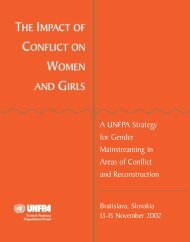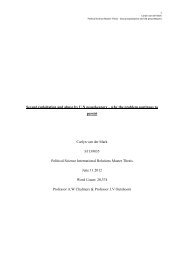Stop Sudah English-revised-March2012 - International Center for ...
Stop Sudah English-revised-March2012 - International Center for ...
Stop Sudah English-revised-March2012 - International Center for ...
You also want an ePaper? Increase the reach of your titles
YUMPU automatically turns print PDFs into web optimized ePapers that Google loves.
who defected in March 1983 and led OPM troops <strong>for</strong> approximately five years. Around 1985–86, several<br />
villages in Pantai Timur Sub-district were burned by soldiers from Jayapura Infantry Battalion 751 and the<br />
Pattimura, Ambon battalion. This measure, known as the “Awom incident”, was intended as a warning to<br />
get Awom and his followers to surrender. The Documentation Team met a victim who testified about the<br />
tense situation. Be<strong>for</strong>e the burning, villagers had been warned by OPM to flee into the <strong>for</strong>est. After about a<br />
week in the woods, villagers began to go home, but the fear still had not disappeared.<br />
When going to the field or anywhere, the army always went along to monitor the movements of the population. If the<br />
army did not follow, we were given a ticket stating we “checked out” at 08.00 and that we had to be back home on<br />
time. If we arrived later than the time specified, we would be punished. The penalty <strong>for</strong> a man was to be dunked in<br />
the sea or a river, while women were yelled at and hit or slapped. If you wanted to go out at night, you had to carry a<br />
fire torch . . . If the road was not lit the army would yell at you and accuse you of being OPM. 32<br />
There was also a woman who was a victim of rape over a long period of time. The rapes began in 1986<br />
when the victim was ten years old.<br />
Every night if I wanted to sleep, a member [soldier] would come to my house to “take action” . . . If I did not want<br />
to have sex, [I] might be kicked, or have a gun held on me. [He] would also come to the house and threaten my<br />
father and mother. This continued <strong>for</strong> one year. The perpetrator usually gave rice, sardines, and onions. I became<br />
pregnant from the relationship with this TNI member and had a daughter, but she died when she was two years old.<br />
Now I am married and have a family. My husband does not pry into my past. 33<br />
Another woman in the same village had a similar experience. The victim recounted that in 1998, postal<br />
officials from the Army Strategic Reserve Command (Kostrad) post and Jayapura Infantry Battalion 751<br />
<strong>for</strong>ced relations with a girl in the village. Because the girl’s parents were afraid of being beaten, they handed<br />
over their daughter to the soldiers who served in the village. At that time, their daughter was 20 years old.<br />
From these relationships the victim became pregnant and gave birth to a daughter. 34<br />
Military involvement in the settlement of daily conflicts among residents was often accompanied by an<br />
abuse of power in the <strong>for</strong>m of sexual torture. Around October to November of 1989, in one village (in<br />
Jayapura District) there were clashes among people who were attending a dance held by the military. A<br />
trivial problem had actually been resolved, but soldiers summoned those considered responsible, including a<br />
woman and a man, then punished them.<br />
Soldiers took my sister-in-law and ordered her to eat a battery until she gagged. The army <strong>for</strong>bid us to take her to the<br />
hospital . . . The next day, I and [a youth who was involved in the quarrel] went to the post . . . They<br />
removed our clothes, then ordered us to go soak in the water . . . and ordered the two of us to lie on the beach <strong>for</strong><br />
about an hour. We were not given any food, so we were very hungry. Then they <strong>for</strong>ced [the youth] to rape me . . .<br />
After that, we . . . walked naked to the post, then, at the post, we were photographed. Once photographed, we were<br />
ordered to walk . . . [me with a banana leaf, the youth naked] . . . All the people saw the two of us, some<br />
could not stand it and did not want to look . . . After that incident, I really couldn’t walk, during my pregnancy . . .<br />
my body ached all over, especially my spine. 35<br />
Several other selected testimonies from other victims of violence in the city of Jayapura during the 1980s<br />
are summarized in the following table.<br />
32 SAR10 narrative.<br />
33 SAR07 narrative.<br />
34 Field notes on SAR01 case.<br />
35 SAR03 narrative.<br />
ENOUGH IS ENOUGH! 22




![IANSA [PDF, 2MB] - PeaceWomen](https://img.yumpu.com/25206379/1/190x123/iansa-pdf-2mb-peacewomen.jpg?quality=85)
![Commitments Sample [PDF, 93KB] - PeaceWomen](https://img.yumpu.com/25206331/1/190x245/commitments-sample-pdf-93kb-peacewomen.jpg?quality=85)










![A Toolkit for Advocacy and Action [PDF, 260KB] - Peace Women](https://img.yumpu.com/25205989/1/190x245/a-toolkit-for-advocacy-and-action-pdf-260kb-peace-women.jpg?quality=85)